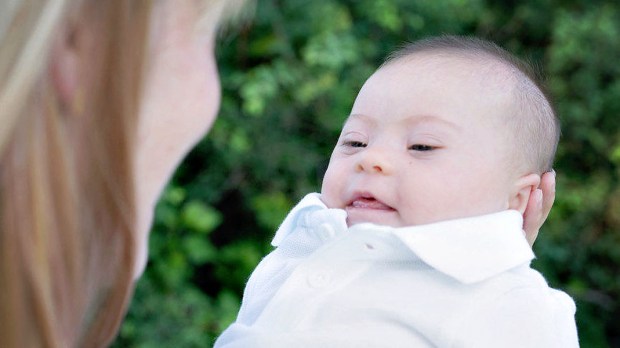Sometimes if I climbed to the top of my backyard playhouse I could see Carey on the sidewalk by her front yard, squatting low to play in the way only she could contort her legs (her low muscle tone made for super-flexibility). She played there with Barbie dolls, wearing her favorite Barbie rockers t-shirt, neon splashes of color, and pink wind shorts. She had pale blond hair and called everyone by their first and last names. “Hello Michaboyett,” she always said with conviction and fierce resolve.
We were in Brownies together. She played volleyball on my third grade team. Her mom took me to school every morning of sixth grade. I’d walk straight into her house on those mornings and find her sitting at the bar in her kitchen finishing her cereal. “Hi Michaboyett,” she’d say.
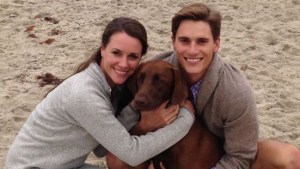
Read more:
Unborn baby with Down syndrome inspired father to run Boston Marathon
When I received the prenatal diagnosis that my child would most likely have Down syndrome, I thought of Carey first. I thought of her big personality, how she always knew what she wanted and how everyone else should behave. I thought of the way she flipped Barbie’s hair back and forth, back and forth to the music in her head those long spring afternoons on her sidewalk.
The results from the blood test came on a Thursday morning in December. I was alone with my then-three-year old, pushing him in a stroller through the park on our way to gymnastics class when the phone rang. The ultrasound two weeks prior had shown one marker for Down syndrome, but still they said it was only a 1 in 476 chance my child would have DS. I’ve never been the one to win raffles or lotteries. I had the blood test just to remove that worry from my mind.
I answered my phone, holding it against my face with my shoulder, a travel mug of tea in one hand, awkwardly pushing the stroller with the other. I stopped walking when the woman on the other line began to speak. The sky shrunk, as if it was pulled by gravity toward me, as if the trees paused their swaying, the planet stopped its swirling, as if God had paused the sun in the sky, as if nature was holding its breath.
Read more:
My son is so much more than Down syndrome
That’s when I learned I was her. I was the one in four hundred and seventy six. I hung up the phone and stood still on the sidewalk, reminding myself to breathe.
How can I write down what I felt in the moment that changed my life? The images that flickered through my mind, a mental slideshow of loss, of a future I’d never planned for? My hands shook in the back of the bleachers during gymnastics class.
In the months that followed I grieved, but I didn’t grieve a person, I grieved my own plans of what our family was supposed to look like. I felt my baby swish inside me and couldn’t make sense of his being mine yet still having this uncertain diagnosis. I loved him the way most mothers love the miraculous growth beneath their own stretched skin. And still, this part of him, these extra chromosomes, they were a mystery.
I thought of Carey everyday. The way she sat, the way her skin felt, the sound of her voice, gruff and expressive. I thought of how we all loved her. Of how she died too soon.
I thought of my older children. What would this cost them? Would they resent their brother for demanding a different life than the one I had imagined for our family? Would they be embarrassed of our baby? Who would care for him when my husband and I couldn’t? Was I capable of learning to be the mom of a child with special needs?
Read more:
Why I’ve Embraced “Attunement Parenting” as the Secret to Raising Healthy, Happy Kids
World Down Syndrome Day is always on March 21. Last year the date fell four weeks before my due date, two and a half weeks before our baby, Ace, was born.
In those final weeks my baby’s growth had slowed down, and there were concerns about my fluid levels. I knew that my child was about to come and everything was going to change. I felt like I should mark World Down Syndrome Day, I should say something about it, even though we hadn’t made our diagnosis public outside of close friends and family.
I sat in the kitchen at my laptop, my pregnant middle resting against the keyboard, and wrote and rewrote a short acknowledgment of the day.
I wanted to say something about my amazement, my awareness that the tiny baby I was carrying was fiercely mine, and perfectly himself, with or without Down syndrome. I wanted to say how much I’d loved being Carey’s friend, about the joy she brought to my life.
But what did I know about Down syndrome? What right did I have to say anything? I deleted my words and closed the computer.
When St. Paul spoke of the life of faith, he said it is like gazing in a mirror dimly. “But soon,” he said, “we will see face to face.”
When Ace arrived the dim mirror separating him from his diagnosis split open. He was born with the most circular, perfectly made face I have ever seen. Sandy hair all over his head. He looked like my baby. He didn’t look like a syndrome.
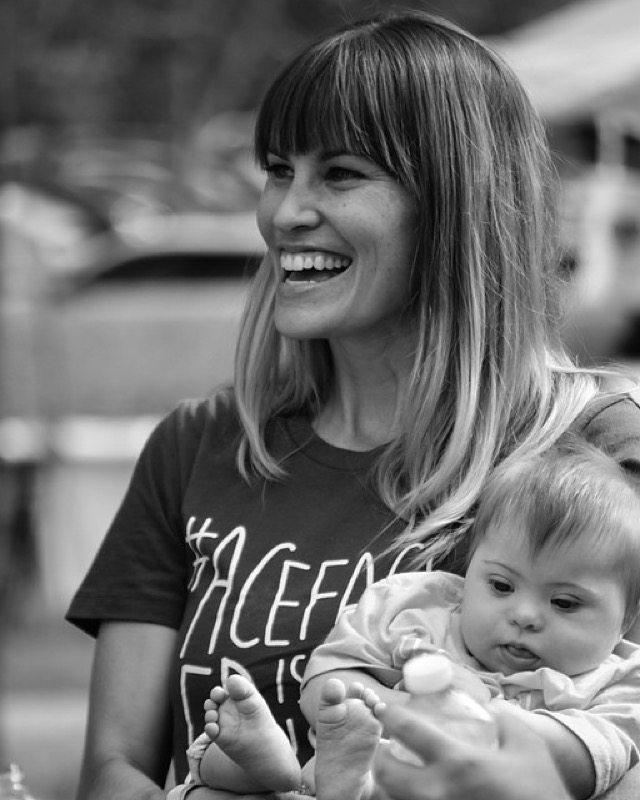
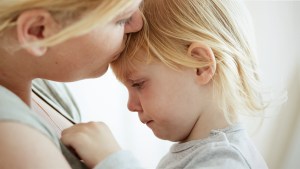
Read more:
How to defuse a child’s tantrum with one question
When we told his brothers what Down syndrome was, they listened with their whole bodies. Their eyes big and steady. “Some things will be easier for him,” I said. “He’ll be the most flexible kid in our family!”
“And some things may be harder for him, like reading, or running. We’ll have to help him and cheer for him, but I know you guys can do that, right?”
What other thing was there to say?
Ace is the dreamiest baby. He is gentler than any person I know, old or young. He lives for his brothers, who surround him with dances and songs, or who blow past him and his tummy time on the quilt, always on their way to snack time or homework, sometimes laughing, sometimes fighting or crying, sometimes talking back to me. Ace watches while I break up wild wrestling matches, or lecture the little boy with the attitude, or dish out consequences. And he waits for our eyes to catch one another. And when they do, I sometimes gasp at the purity of his love for us. We the undeserving ones.
Ace simply longs to see us, and for us to see him.
Last week I read something about power, about the ways we humans are always grasping for it: we long to be something important, to perform well enough, to earn respect, to earn applause. That’s it, I thought. It’s not that Ace is somehow better than us, more angelic than us. Or even that he’s operating on a different level of human goodness. It’s simply that he—even as a baby—doesn’t seem to grasp for power. He’s not desperate for importance. He simply longs to love and be loved, to know and be known. And when he is seen, he erupts in smiles. He claps his hands.
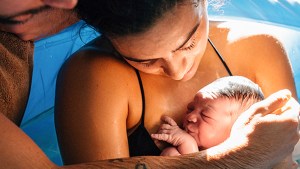
Read more:
10 Photos that perfectly capture the joy of motherhood
Last month in the car after school my seven-year-old said, “Mom, I don’t want Ace to be different. I don’t want him to look different than other kids because that makes me really sad.”
“Yeah, that must feel really hard, buddy,” I said. “I’m sorry that makes you sad.” Again, what else was there to say?
We suffer in this life. And it’s not about whether or not the suffering will come, it’s how, and when, and how we will respond. I thank God my older sons are learning that truth now: that being different is both hard and beautiful, that joy is not found in running from suffering, but leaning right into it, and coming out wiser and more generous.
Yes, it will be painful for my older sons to see Ace struggle, but I believe Ace’s life will help them grow more naturally into compassionate men, the kind who learned to love someone who didn’t grasp for power. I pray they’ll learn from Ace how to work hard, how to love big, how to prioritize friendship over performance.
There have been moments when I’ve thought about the other 475, the other women whose babies showed markers of DS but whose blood tests came back negative. I’ve felt jealous, or asked why it had to be harder for me, for my baby.
And now, one year after that World Down Syndrome Day when I didn’t know what to say, or how to say it, when my sweet baby’s face was momentarily lost in the dim mirror of a diagnosis I didn’t know how to embrace, I’ve been learning to recognize the reality of the gift I was given.
The chances were 1 in 476, and I won the lottery.

Read more:
It’s impossible to savor every single moment of life — and that’s okay
If I could write that Facebook post for my pregnant self, the woman at the kitchen table with her laptop open, the woman who feared she was walking into a world of loss and sorrow, this is what I would say to her:
Sweet girl, take a deep breath. You just won the lottery.
This is not what you planned for and those are the best of all the adventures.
I would tell her that her older sons are capable of tenderness she’s never seen before. I’d tell her that loving another person is always a risk, whether or not that person has a disability. I’d tell her about the day I put three-month old Ace down for a nap and my oldest son asked me to pray “that Ace’s Down syndrome won’t hurt him.”
I’d tell her how when Ace cries my five-year-old half shouts/half sings the song we wrote together: “I am Acey! I am Acey! I’m a sweet little boy!” I’d tell her how, despite the chaos of all of it, as soon as Ace hears his brother’s voice he always stops crying, just so he can listen.
I’d tell her that there was never a different story. The one she had in her head, the one with three typically developing sons all growing up strong and handsome and successful with easy lives.
This was the real story all along, I’d tell her. The true story of our family. Your older sons were created with this plan already in motion. And it’s perfect this way, I’d say. Just watch and see.
I’d remind her of Carey playing on the sidewalk in that Barbie shirt, how she loved Carey and Carey loved her.
I’d tell her it’s worth it, all of the risks, all the fears, all the therapies and challenges and the uncertainty of the future. It’s worth it because love is bigger and wilder and more spectacular than she can imagine.
It’s World Down Syndrome Day, one year later, I’d say. And I won the lottery.
